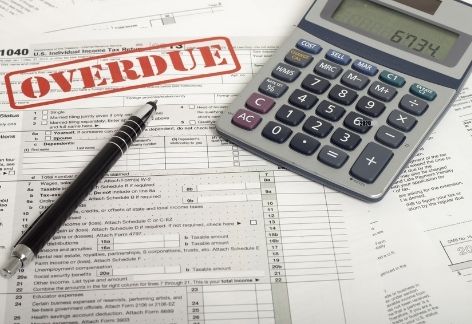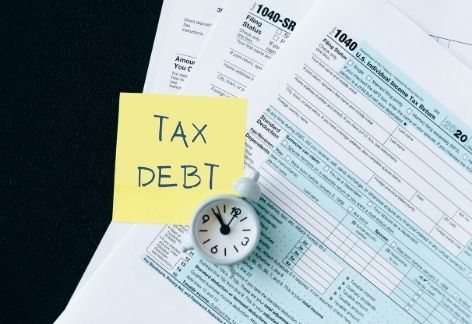If you find yourself owing money to the IRS, it can be a very stressful situation. One thing to note and understand is that there are IRS statute of limitations on your debt - here is what to know.
[lwptoc]
Tax debt is not forever. There are limits to what the IRS can do – and while they can practically pursue you to the ends of the earth, every instance of tax debt has an expiration date.
However, that doesn’t mean that dealing with your tax debt is as simple as letting the clock run out, and just biding your time. The IRS has a number of powerful and coercive collection tools at its disposal – and unless your tax debt simply happened to go uncollected for years, your chances of waiting it out successfully (or at least, without dire consequences) are generally very low.
Your Tax Debt Has an Expiration Date
The collection statute expiration date (or CSED, for short) is ten years from the date written on your tax assessment letter or notice. However, the IRS has ways to extend the CSED on your tax debt, without necessarily telling you that it has done so.
Your tax assessment date can be determined on the notice the IRS sent you when it first explained your due tax balance. When the IRS notifies you of a due balance, it’s because they’ve had a look at your account and realized that you owe them money – whether due to an old penalty for filing late, or including a deduction that you actually didn’t end up qualifying for, or some other information that meant that the amount of tax you paid over the year isn’t enough to cover the amount of tax you owe.
Furthermore, it isn’t in the IRS’s interest to tell you how close your debt is to expiring – nor do they try to warn you if you’re nearing your expiration date. The IRS will try its best to extend the CSED in its final days, however, which is why it is critical that you talk to a tax professional if you believe your debt may be close to expiring.
The IRS Statute of Limitations Expiration Date Can Be Extended
For all intents and purposes, the CSED means that the IRS has ten years to collect money from you for an instance of tax debt. If you meet certain eligibility criteria, you may benefit from the IRS Fresh Start Program details, which aim to provide relief to taxpayers struggling to pay their debts. This program can offer options such as installment agreements and reduced penalties, helping you manage your financial obligations more effectively. Understanding the specific provisions of the program can empower you to take action and potentially relieve some of the pressure of tax liabilities.
If you are nearing your CSED, the IRS may indirectly ask you to extend the expiration date. It might do so through a more favorable payment plan, for example. Under this circumstance, you might pay less every month than you would otherwise, but you’d be obligated to continue paying for an extended period past the 10-year limit, as per the terms of the plan.
However, the IRS cannot always successfully or legally coerce payment. There are multiple circumstances under which the IRS’s authority and ability to collect is temporarily limited. Whenever these circumstances arise, the IRS’s CSED is delayed. Because the IRS cannot freely pursue collection actions against your account at a certain time, the CSED is frozen for that time.
This is what is called a tolling period.
Types of Tolling Periods
Whenever the IRS cannot enforce a collection action, your CSED is effectively frozen. A few key tolling periods that can drastically affect when the IRS statute of limitations expires include:
-
-
- Bankruptcy proceedings, including an additional six months after the end of the proceeding.
- An Offer in Compromise with the IRS.
- Filing an appeal with the Office of Independent Appeals.
- Filing a lawsuit against the IRS.
- Being out of the country for more than 6 months.
- Military deferments.
- Signing an extension waiver (usually in a payment plan with the IRS).
- Filing as currently not collectible due to financial hardship.
-
If you’re unsure how long you’ve had your debt and would like to know how close (or far) you are to your potential tax debt expiration date, consider speaking to a tax professional.
The IRS May Not Inform You of An Upcoming Expiration
Again, it isn’t the IRS’s job to help you keep track of your debt’s CSED. If it’s been nearly a decade, then going over your financial and tax history with a tax professional may be your best bet for figuring out whether waiting it out is a viable option – or whether you should settle a payment plan with the IRS as soon as possible.
What If Your Debt is Young?
The thing about tax debt is that it can grow rapidly. The IRS levies certain penalties and steep interest rates on taxpayer debt, meaning a debt that goes ignored can become a financial behemoth over the years.
Settling your debt as early as possible – even if that means taking out a loan or seeking some other form of financing – is heavily advised. Most creditors offer much better terms, conditions, and interest rates than the IRS does.
For the majority of people, waiting out your tax debt simply isn’t a viable or smart option. Not only will your debt grow substantially the longer you wait, but the IRS’s collection tools can have a massive impact on your quality of life.
The first thing the IRS does when coercing payment is to file a public notice of federal tax lien. This is a legal claim on all of your assets and property, meaning you are heavily restricted when it comes to seeking refinancing, liquidating assets to cover other debts, or taking out a loan. A lien means the IRS takes priority over every other creditor – you need to pay them off before you can pay off your other obligations. If you have received a lien, the first thing to do is contact a professional for tax lien release.
Liens turn to levies, which are a physical claim of your assets and property. When initiating a levy, the IRS has the right to take a portion of your wages, empty out a bank account, or sell a non-exempt piece of property to cover your debt.
Settle ASAP or Wait It Out?
Under most circumstances, waiting for the IRS statute of limitations only makes things worse. Federal tax debt can persist after bankruptcy, and even financial hardship only causes the government to put its collection actions on hold (which extends the CSED), but not remove the debt.
Consult the tax professionals at Rush Tax Resolution if you aren’t sure how best to proceed. Not only can they help you navigate the IRS’s rules and collection actions, but they’d be able to help you settle for less, if you can’t fully pay off your debt.











